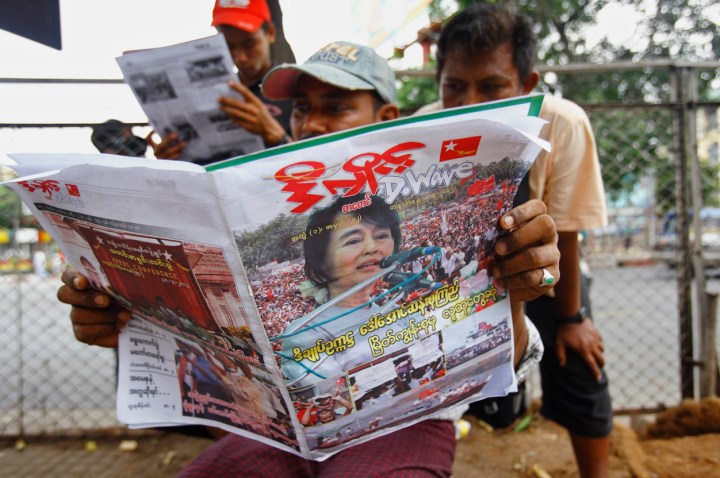Pro-democracy leader Aung San Suu Kyi’s landmark victory in Sunday’s Burmese by-elections appears to offer the promise of change in a country that badly needs it. But it would be premature to start popping the champagne corks just yet. By REBECCA DAVIS.
A telling indication of the struggles for national identity with which Burma has been preoccupied for over half a century is the number of name changes the country has experienced.
Under British colonial rule, it was Burma. After independence in 1948, it was the Union of Burma. Following 1962’s military coup, it became the Socialist Republic of the Union of Burma in 1974. In 1989, following the second military coup, the Union of Myanmar came into being, as an attempt to shake off the colonial associations of the name ‘Burma’. The constitutional referendum of 2008 saw the country’s name change to the Republic of the Union of Myanmar, which is where we currently sit.
Except, of course, that half the world won’t acknowledge the name change from Burma to Myanmar, believing that to do so would give the stamp of legitimacy to a regime which routinely ranks as one of the world’s most repressive.
Another striking fact about the south-east Asian country is that, for the past 50 years, all regime change in the country has taken place via assassinations and coups d’etat. Prior to the two World Wars, Burma was under colonial domination by the British – who incidentally set Burma on the path of economic collapse by destroying all the country’s oil wells and mines during World War II to keep the Japanese from getting at them. The period between 1948 and 1962 – when the military seized control – has been the only democratic stretch the country has known in modern times.
Things might have been different if Aung San, the father of independent Burma, had not died in a hailstorm of assassins’ bullets in 1947. Then again, they might not. Burma’s extreme ethnic diversity would likely pose a challenge to any leader – even Aung San’s daughter, the woman they call the “living saint”, the Lady, Daw (Auntie) Suu.
Sunday’s by-elections were not the first time Suu Kyi’s National League for Democracy (NLD) has dominated the Burmese polls – in 1990 the party won an estimated 80% of parliamentary seats, but the military refused to give up power. Even if the military had acknowledged the results, Suu Kyi was prevented from standing as a candidate for election due to being married to an Englishman, Oxford academic Michael Aris. This time round the NLD has only won about 7% of parliamentary seats. The critical point is, however, that they are expected to win all 44 of the seats they contested, though official results have yet to be released.
Suu Kyi’s own by-election victory came in the constituency of the Kawhmu township. The Guardian suggested Suu Kyi chose that constituency because she wanted to draw attention to the lives of ordinary Burmese villagers, a third of whom live on less than R4 a day – less than R125 per month. This is the lowest income in south-east Asia.
In the by-elections, Suu Kyi was up against a candidate called Dr Soe Min, from the military-backed ruling Union Solidarity and Development Party. Before the elections, Soe Min told Reuters that Suu Kyi’s “weak point” was that “She knows more theoretically. I know more practically.”
This may sound like a candidate sure of defeat grasping at straws, but it is a criticism that has been levelled at Suu Kyi before. She has spent 15 years under house arrest since her return to Burma in 1988, and before that she had been living in the UK for decades. While she has made an incalculable contribution to the struggle for a democratic Burma, we still have little sense of what she would be like as an everyday, hands-on politician.
It was reported there were scenes of jubilation across the country as news of the NLD’s victory spread yesterday. Yet key actors urged caution in response to the polls. US Secretary of State Hillary Clinton, who earlier this year became the first individual in her position to visit Burma for decades, gave congratulations but also warned: “There are no guarantees for what lies ahead for the people of Burma”.
Aung San Suu Kyi’s victory speech in Rangoon also hinted at a tense time ahead. She appeared to be trying to head off the spectre of political violence by urging her supporters not to “upset the feelings of those on the other side”, and to “act in a controlled way”.
Much of the wariness that accompanies the news of the election results is due to a sense of uncertainty about whether Burmese president Thein Sein is trustworthy or not. Suu Kyi’s biographer, Peter Popham, says Thein Sein is believed to be “scrupulously honest”, but also shrewd in that he recognised that the quickest way to improve relations with the West was to improve the treatment of Suu Kyi, as the most emblematic pro-democracy figure in the country.
Over the past few years Thein Sein has made a series of moves in the direction of reform in addition to freeing Suu Kyi. About 200 prominent political prisoners have been released – although this still leaves an estimated 1,600 detainees in jail. Media censorship has been relaxed somewhat, and access to websites like YouTube is now permitted.
But it’s not clear whether these actions are genuine attempts to steer the country towards democratic reform, or merely window-dressing activities designed to appease the international community, lift sanctions and thereby improve Burma’s economic prospects.
Writing for the Guardian last year, John Simpson suggested this might be the case: “[Suu Kyi]’s release from house arrest last November, instead of undermining the Burmese junta, seems almost to have strengthened it… Even in the seven months since then, I noticed signs of growing Chinese investment and influence when I went in with the BBC team to record [a series of lectures given by Suu Kyi]. Burma’s oil and gas resources are so great that its neighbours are much more interested in opening up trade links with the junta than supporting [Suu Kyi’s] campaign for political freedom.”
China has consistently propped up the junta with military aid, and was one of three countries to vote against a draft UN Security Council resolution in 2007, calling on the Burmese government to respect human rights and begin the transition to democracy. The other two were Russia and South Africa. In South Africa’s decision to veto the resolution, their major argument was that Burma did not pose any threat to international security, and that the resolution dealt with “issues that would be best left to the Human Rights Council”.
There are compelling reasons for the international community to want to believe that Burma is now a legitimate target for investment and trade. Population-wise Burma is the second largest country in south-east Asia, and the 24th most populous in the world, with almost 60 million inhabitants. It is also the largest country in the region from a geographical perspective. Throw in the oil and gas reserves, and you have a pretty tasty prospect.
International firms had previously been put off investing in Burma because there existed a de facto double exchange rate – one the “official” version and one the black market rate, with the difference between the two reflecting the greatest discrepancy between official and unofficial exchange rates ever recorded, according to the BBC.
As of Monday, however, the Burmese central bank has set the exchange rate at 818 kyat to the US dollar, which is expected to ameliorate matters considerably. The Diplomat website went so far as to suggest that Burma may be Asia’s “new economic tiger” if it takes the right directions from its current economic crossroads, including liberalising the market. As such, don’t be surprised to see foreign powers scrambling to lift sanctions on the basis of Sunday’s election results.
Aung San Suu Kyi has said she believes Thein Sein is genuinely interested in reform, but that the stumbling block will be how much support he can muster from within his own party. The next general elections only take place in 2015, so we’re working with pretty long time frames here. For those elections to be meaningful, however, Suu Kyi’s NLD will have to succeed in removing the constitutional provision that currently reserves 25% of all parliamentary seats for the military.
As for what happens in the interim, that’s not quite clear. There have been rumours that Suu Kyi might be offered a Cabinet job by Thein Sein, but it may be more productive for her to stay as an opposition MP while she attempts to build support for constitutional reform, the protection of human rights and an independent judiciary. If she were to take on a ministerial position, some argue, she would also be tacitly offering support to a non-democratic parliament: most senior ministers are still former generals.
Burma Campaign UK director Mark Farmaner succinctly summed up the challenges Suu Kyi faces in an interview with Radio National on Monday: “Above the parliament is a president who is not accountable to parliament. Above him is a military council – the National Defence and Security Council – and above them is the military, which is constitutionally not accountable to the government or to the parliament”.
For anything real to change in Burma, these structures will need to be entirely dismantled. But let’s not focus entirely on doom and gloom – the prospect of an opposition voice in the Burmese parliament is still an exciting and promising one. There are interesting times ahead for Burma and, almost certainly, more name changes. DM
Read more:
- Aung San Suu Kyi hails ‘new era’ for Burma after landslide victory, in the Guardian.
Photo: People read a journal on a walkway in Yangon on 2 April 2012. Aung San Suu Kyi won a seat in parliament on Sunday, her party said, after an historic by-election that is testing the country’s nascent reform credentials and could persuade the West to end sanctions. REUTERS/Staff .






 Become an Insider
Become an Insider